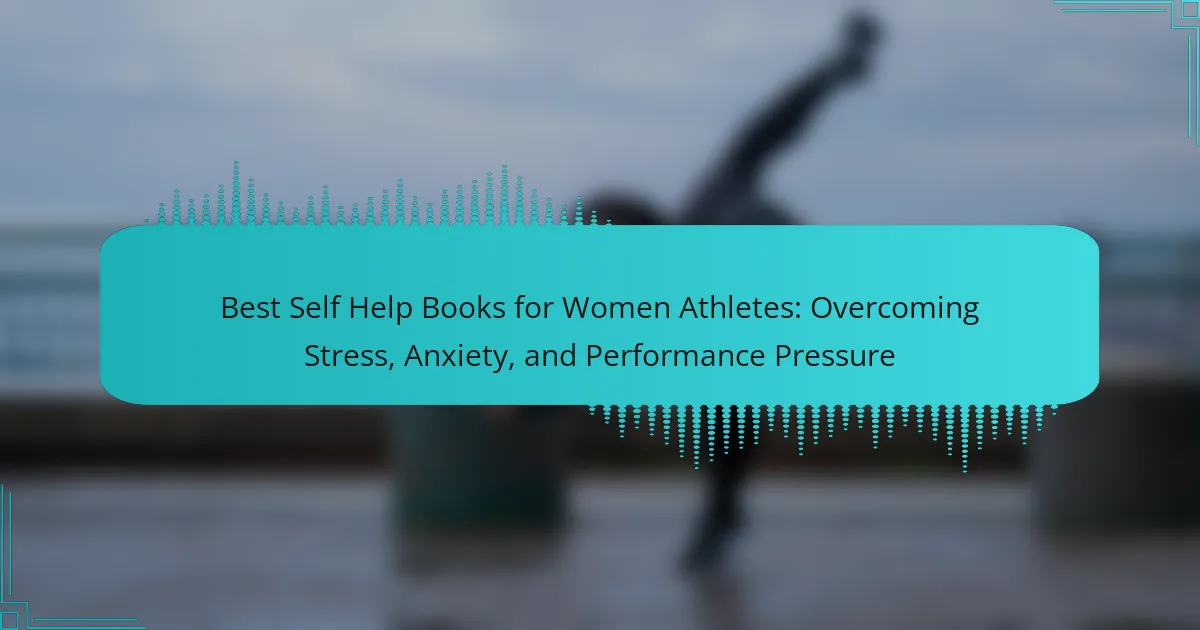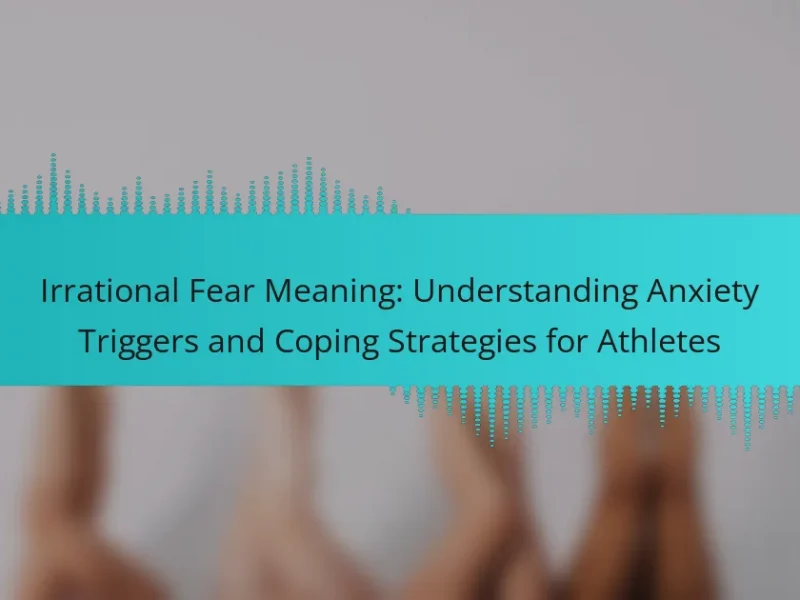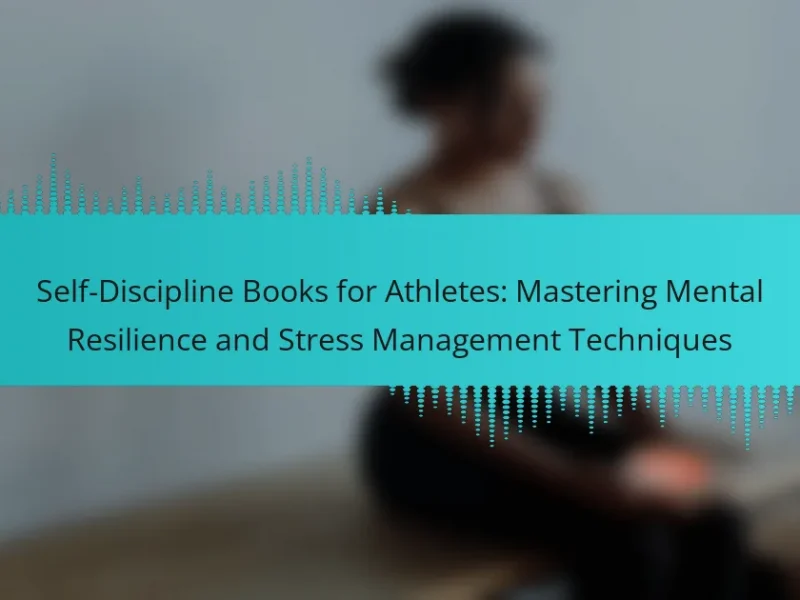Women athletes often face unique challenges such as stress, anxiety, and performance pressure. This article explores the best self-help books that provide strategies for building mental resilience, enhancing focus, and overcoming negative self-talk. Each book offers actionable tips and insights tailored to the needs of female athletes, emphasizing the importance of community support and mindfulness techniques. Understanding these resources can empower women athletes to improve their mental well-being and performance.
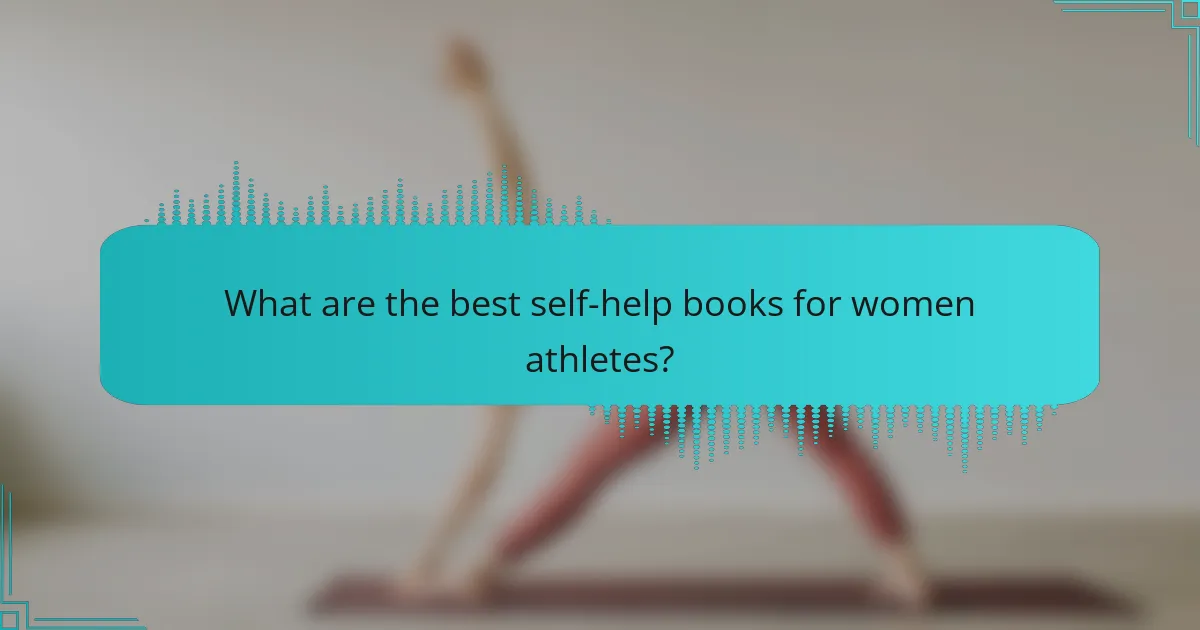
What are the best self-help books for women athletes?
“Best Self Help Books for Women Athletes” include “The Confidence Code” by Katty Kay and Claire Shipman, focusing on building self-confidence. “Mind Gym” by Gary Mack offers mental training strategies for performance enhancement. “Grit” by Angela Duckworth emphasizes perseverance and resilience. “The Inner Game of Tennis” by W. Timothy Gallwey explores mental aspects of performance. “You Are a Badass” by Jen Sincero encourages self-empowerment and motivation. Each book addresses unique attributes like overcoming anxiety, enhancing focus, and developing mental toughness.
How do these books address stress and anxiety?
These books provide practical strategies to manage stress and anxiety specific to women athletes. They emphasize mindfulness techniques, cognitive-behavioral approaches, and personal anecdotes from successful athletes. Many include exercises designed to enhance mental resilience, helping readers cope with performance pressure effectively. The unique attribute of these books is their focus on women’s experiences in sports, offering relatable insights and tailored advice. As a result, they empower readers to transform anxiety into motivation and improve overall well-being.
What are the core themes in these self-help books?
The core themes in self-help books for women athletes include resilience, mental health, and performance enhancement. These books focus on overcoming stress and anxiety, fostering a positive mindset, and developing coping strategies for performance pressure. They often emphasize the importance of self-care, goal setting, and building a supportive community. Additionally, they explore the unique challenges women face in sports, offering tailored advice to empower female athletes.
Which authors are recognized for their expertise?
Several authors are recognized for their expertise in self-help literature for women athletes. Notable figures include Dr. Joan Steidinger, known for her work on performance psychology, and Dr. Jennifer A. Heisz, who focuses on the impact of mental health on athletic performance. Additionally, Dr. Michelle Segar, an expert in motivation and well-being, offers insights into stress management. Their contributions address overcoming stress, anxiety, and performance pressure effectively.
What unique insights do these books offer?
These books provide unique insights into managing stress, anxiety, and performance pressure specifically for women athletes. They offer practical strategies, such as mindfulness techniques, mental conditioning exercises, and personal anecdotes from successful female athletes. These insights help readers develop resilience and enhance their mental game, ultimately improving athletic performance. Furthermore, they emphasize the importance of community support and self-advocacy in overcoming challenges unique to women in sports.
How do they cater specifically to women athletes?
Self-help books for women athletes specifically address their unique challenges, such as stress and performance pressure. These books often provide tailored strategies for coping with anxiety, enhancing mental resilience, and fostering a supportive community. They emphasize the importance of self-care and mental health, recognizing that women face distinct societal and athletic pressures. Additionally, many authors draw from personal experiences, offering relatable insights that resonate with female athletes. This focus on women’s specific needs helps create a more inclusive and empowering environment in sports.
What strategies do they recommend for performance pressure?
Women athletes can manage performance pressure through strategies like mindfulness, visualization, and setting realistic goals. Mindfulness techniques help in reducing anxiety by promoting focus and presence. Visualization allows athletes to mentally rehearse successful performances, enhancing confidence. Setting realistic goals fosters a positive mindset, enabling athletes to measure progress without overwhelming stress.

What universal coping strategies are discussed?
Effective universal coping strategies for women athletes include mindfulness, time management, and social support. Mindfulness techniques help reduce anxiety and improve focus. Time management skills enable better preparation and reduce performance pressure. Social support from peers and coaches fosters resilience and encourages shared experiences. Integrating these strategies can enhance mental well-being and performance.
How can visualization techniques help athletes?
Visualization techniques significantly enhance athletes’ mental resilience and performance. By mentally rehearsing their skills and strategies, athletes can reduce anxiety and stress. This practice improves focus, boosts confidence, and fosters a positive mindset, essential for overcoming performance pressure. Studies show that athletes using visualization techniques report better outcomes and increased self-efficacy, reinforcing the value of mental preparation in sports.
What role does goal-setting play in managing stress?
Goal-setting significantly reduces stress by providing direction and focus. It helps women athletes clarify their objectives, prioritize tasks, and maintain motivation. Setting specific, measurable, achievable, relevant, and time-bound (SMART) goals creates a framework for managing performance pressure. This structured approach fosters resilience against anxiety, enhancing overall well-being. Studies show that athletes who engage in regular goal-setting experience lower stress levels and improved performance outcomes.

What rare attributes set these books apart?
These books stand out through their unique focus on mental resilience, tailored strategies for women athletes, and integration of performance psychology. They often emphasize community support and personal narratives, enhancing relatability and motivation. Additionally, some incorporate specific mindfulness techniques that are rare in general self-help literature, providing targeted tools to manage stress and anxiety in competitive environments.
Are there any unconventional approaches mentioned?
Yes, unconventional approaches include mindfulness techniques, visualization exercises, and narrative therapy. These strategies help women athletes manage stress and enhance performance. Mindfulness promotes present-moment awareness, reducing anxiety. Visualization aids in mental rehearsal, improving focus and confidence. Narrative therapy encourages athletes to reshape their personal stories, fostering resilience and empowerment.
How do personal stories enhance relatability?
Personal stories enhance relatability by creating emotional connections and shared experiences. They allow women athletes to see their challenges reflected in others, fostering a sense of community. This connection can reduce feelings of isolation often associated with stress and anxiety in competitive environments. Additionally, personal narratives in self-help books provide practical insights that resonate on a personal level, making strategies for overcoming performance pressure more accessible and relatable.
What innovative practices do these authors suggest?
These authors suggest innovative practices such as mindfulness techniques, visualization strategies, and goal-setting frameworks. Mindfulness helps athletes manage stress and anxiety. Visualization enhances performance by mentally rehearsing success. Goal-setting frameworks provide structured pathways to achieve personal and athletic objectives.

How do cultural factors influence stress management in sports?
Cultural factors significantly influence stress management in sports by shaping athletes’ perceptions and coping strategies. Different cultures prioritize various aspects of performance, which affects how athletes handle stress and anxiety.
For instance, collectivist cultures may emphasize teamwork and community support, leading to shared coping mechanisms. In contrast, individualistic cultures often promote personal achievement, which can heighten performance pressure.
Additionally, cultural beliefs regarding mental health can impact the acceptance of stress management techniques. Athletes from cultures that stigmatize mental health issues may resist seeking help, while those from more open backgrounds may utilize resources like self-help books.
Understanding these cultural nuances is essential for developing effective stress management strategies tailored to women athletes, helping them overcome anxiety and performance pressure.
What regional perspectives are highlighted in these books?
These books highlight regional perspectives by addressing unique cultural challenges women athletes face globally. For instance, they explore how societal expectations in different regions affect performance pressure and mental health. Additionally, the literature emphasizes the importance of community support systems in various cultures, showcasing diverse coping strategies. This regional focus enriches the content by providing relatable examples and insights tailored to specific audiences.
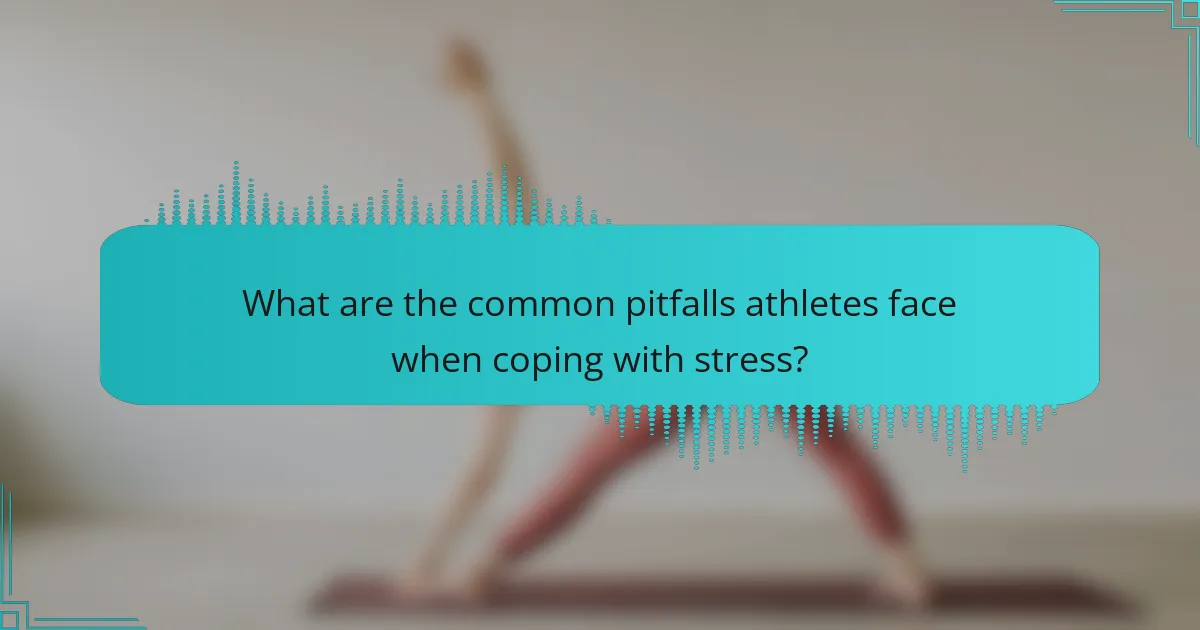
What are the common pitfalls athletes face when coping with stress?
Athletes often face common pitfalls when coping with stress, including poor time management, lack of support, and negative self-talk. These factors can hinder performance and exacerbate anxiety.
1. Poor time management: Athletes may struggle to balance training, competition, and personal life, leading to increased stress.
2. Lack of support: Insufficient emotional or psychological support from coaches, teammates, or family can intensify feelings of isolation.
3. Negative self-talk: Athletes often engage in self-criticism, which can undermine confidence and increase anxiety.
4. Unrealistic expectations: Setting overly ambitious goals can create pressure, leading to stress and burnout.
5. Inadequate coping strategies: Without effective methods to handle stress, athletes may feel overwhelmed during competitions.
Addressing these pitfalls is crucial for women athletes seeking to overcome stress and enhance performance.
How can athletes avoid these mistakes?
Athletes can avoid mistakes by implementing effective strategies from self-help books. Prioritize mental resilience, practice mindfulness, and develop a support network. These books often emphasize the importance of self-awareness and goal-setting, which can help manage stress and performance pressure. Regularly reviewing techniques from these resources can lead to improved focus and reduced anxiety during competitions.
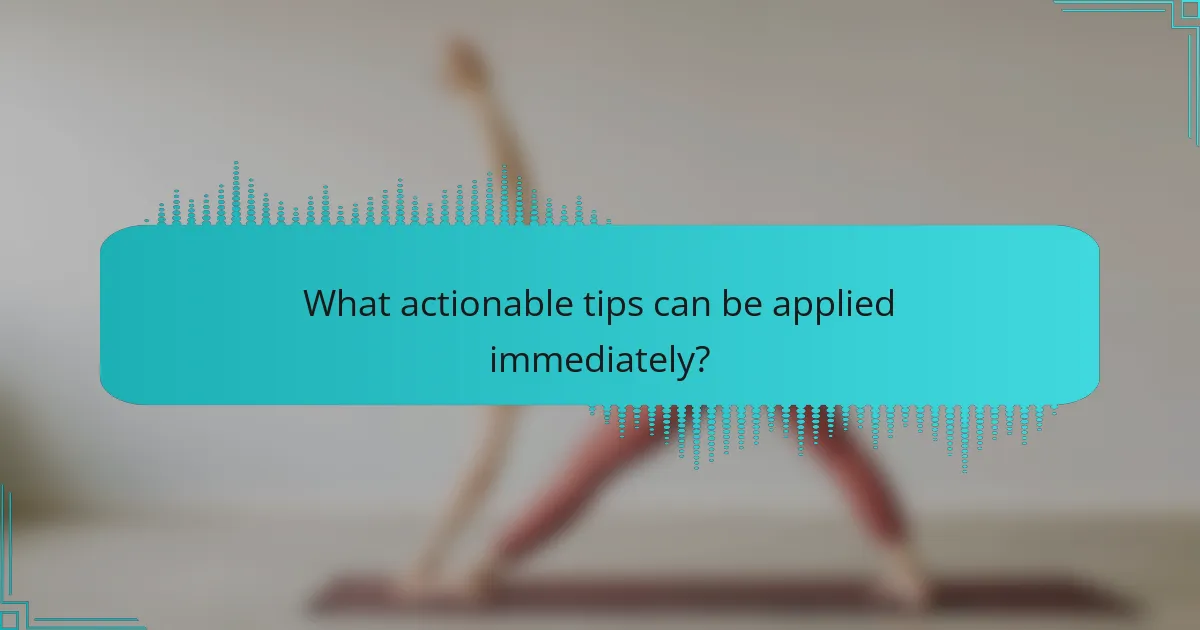
What actionable tips can be applied immediately?
To overcome stress, anxiety, and performance pressure, women athletes can implement these actionable tips immediately.
1. Establish a daily routine that includes time for physical training, mental preparation, and relaxation techniques.
2. Practice mindfulness through meditation or deep-breathing exercises to enhance focus and reduce anxiety.
3. Set specific, achievable goals to foster a sense of accomplishment and maintain motivation.
4. Engage in positive self-talk to counter negative thoughts and build confidence.
5. Seek support from coaches, teammates, or mental health professionals to address emotional challenges.
6. Incorporate recovery strategies, such as proper nutrition and sleep, to enhance overall performance and well-being.
What best practices should women athletes follow?
Women athletes should prioritize mental resilience and self-care strategies. Effective practices include setting realistic goals, utilizing mindfulness techniques, and maintaining a balanced routine. Incorporating stress management methods from self-help books can enhance performance and well-being. Engaging in regular physical and mental training fosters a positive mindset, essential for overcoming performance pressure.
How can athletes create a personalized coping plan?
Athletes can create a personalized coping plan by identifying stressors and setting specific goals. They should incorporate techniques from self-help books focused on overcoming anxiety and performance pressure. Regularly reviewing and adjusting the plan enhances its effectiveness. Engaging in mindfulness exercises and establishing a support network are also essential components.
What resources are available for further support?
Several resources support women athletes in overcoming stress and performance pressure. Notable self-help books include “The Confidence Code” by Katty Kay and Claire Shipman, which focuses on building self-assurance. “Mindset” by Carol S. Dweck explores the growth mindset essential for athletes. “The Inner Game of Tennis” by W. Timothy Gallwey offers insights into mental resilience. Online platforms like Headspace provide guided meditations tailored for athletes. Additionally, workshops and seminars led by sports psychologists can enhance coping strategies and mental toughness.
